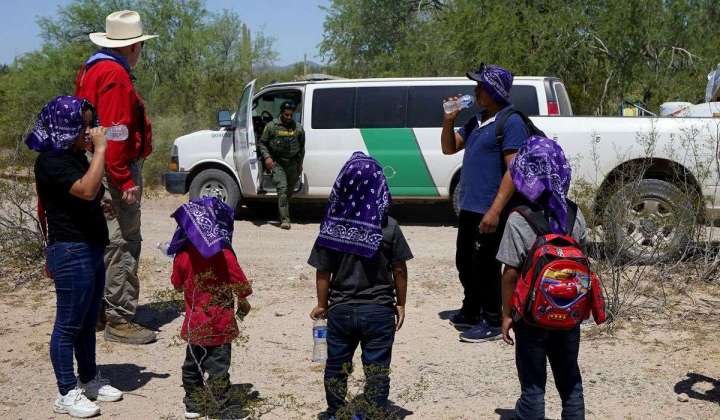DHS is separating migrant parents from their children in Border Patrol facilities

Homeland Security is separating children from their families in Border Patrol facilities in Texas, saying the surge of migrants is too overwhelming to accommodate them all.
Children as young as 8 years old, who are supposed to be kept in cells with their parents, are instead being put into cells that hold unaccompanied children, according to a special monitor appointed by a federal judge to oversee border detention. The monitor said it’s possible some children younger than 8 also have been separated.
Dr. Paul H. Wise, the monitor, said the result is a new trauma inflicted on kids who have just survived the treacherous journey to reach the U.S.
“Interviews with separated children in this age group revealed significant emotional distress related to separation, including sustained crying and disorientation, particularly due to the child’s uncertainty as to the location of the parent and when, and even if, child and parent might be reunited,” Dr. Wise said in his report to Judge Dolly M. Gee.
He didn’t give numbers on how many children have been separated, but said it’s bad enough that it’s erased much of the good work CBP has done over the last year to try to improve conditions for children at the border facilities.
“However, these efforts to provide trauma-informed care and a child-friendly environment have been rendered irrelevant for children who have been separated from their parents while in custody,” he said.
Family separation has been a touchy area for Homeland Security since the Trump administration, when the government tried to stop a surge of migrant families by prosecuting parents for illegal entry, a misdemeanor. Since the criminal justice system doesn’t have family jails, the children were taken and put in the care of Health and Human Services.
But the government had no way of reuniting the families once the parents’ criminal cases were completed, often after just a couple of days with a guilty plea and a sentence of time served. Thousands of children were separated.
The current border situation is different, in that the families are at the same facility and are reunited once they leave, the special monitor said.
But the surge of migrants means that they are regularly separated while in holding cells, with the children held in child-only rooms.
Homeland Security didn’t respond to an inquiry for this story. Neither did a lawyer who represents the children before Judge Gee.
Judge Gee oversees what’s known as the Flores Settlement, a decades-old agreement that sets standards for how illegal immigrant children are to be handled.
The agreement originally applied only to Unaccompanied Alien Children, or those who showed up at the border without parents and who are seen as the most vulnerable victims in the immigration debate.
In 2015, Judge Gee expanded the settlement to apply to children who came with parents. That ruling, which effectively limited the time families could be detained and led to catch-and-release, helped spark the run of families that has upended the usual immigration patterns since 2016.
The ruling also set Judge Gee up as the arbiter of detention conditions, and she has ordered routine monitoring of events, with Dr. Wise as one of those reporting back.
Among other findings in his new report, filed last week, were:
– CBP didn’t have enough sleeping mats for the migrants.
– Hundreds of children were held in border facilities for longer than 72 hours in June and July. Sixteen of those were in custody for more than two weeks, including one who came as an unaccompanied child.
– CBP shifted facilities in south Texas during the early part of the review period, leaving it with too few spaces, particularly for fathers who came with children.
– Kids ages 2 to 5 were being fed adult meals.
On the plus side, the monitor said CBP has been expanding its “caregiver” program to help keep the children occupied, and the children said they feel safe in the facilities.
Those mark improvements over the past, and help lessen the trauma children face from the journey and arrests.
But the separations undo much of that good work, the monitor said.
“None of the trauma-informed steps CBP has implemented over the past year has the ability to counteract the deleterious impact of separating a child from a parent while in a CBP facility,” said Dr. Wise.
Dr. Wise also said CBP needs to improve medical decision-making for care delivered to the children in border facilities.
He pointed to the death in May of Anadith Reyes Alvarez, 8, from Panama. She had been held for nine days along with her family in Harlingen, Texas, and had sickle cell anemia and other conditions.
Anadith was suffering from the flu and her mother had repeatedly tried to get treatment for her daughter but was refused.
The Associated Press reported that a study of the girl’s case concluded her death was “a preventable tragedy” that resulted from poor decision-making and a nurse’s failure to get her symptoms checked by a doctor.






